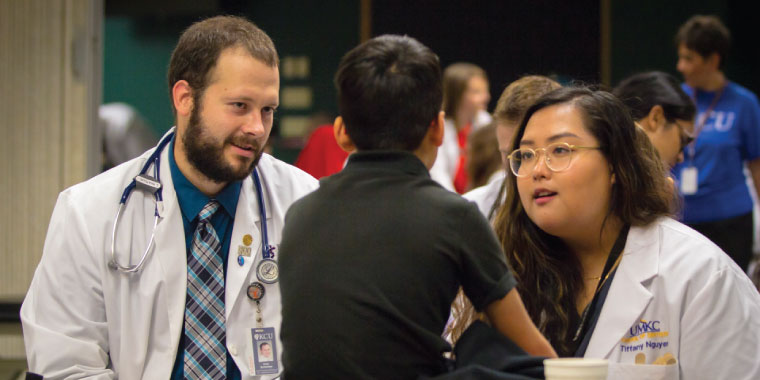Collaboration, Communication & Care

KCU's Interprofessional education focus with classroom-to-clinical experiences is designed for team-based learning
By Kimberly Winter Stern and Marci Nielsen, PhD, MPH
The colloquialism that ‘there is no “I” in team’ holds especially true when physicians, psychologists and other health care professionals work together to deliver team-based care. Patients and their families can better meet their health goals with a team of supportive health professionals, while clinicians are able to “share the care” and better manage burn-out in the ever-changing care environment. This concept of training students in interprofessional health education (IPE) is a growing priority at KCU.
The World Health Organization states that Interprofessional Education (IPE) “occurs when two or more professions (students, residents and health workers) learn with, about, and from each other to enable effective collaboration and improve health outcomes.” Although the idea that teams and collaborative practice can improve health care has been around for more than 50 years, educating health professionals in these concepts in still catching on. According to the National Center for Interprofessional Education, many clinicians and researchers have experimented with a variety of approaches for educating health professionals to work in teams.
IPE is reflected in KCU’s new strategic plan, in part because of the school’s commitment and dedication to student-focused education and patient-centered care. Considered a critical component in training future health care providers to enter a collaborative workforce1, IPE promotes a team approach among students from varied health care professions.
“In the past, when it came to caring for patients, the doctor often functioned as the central figure in care delivery,” said Schoen Kruse, PhD, F-NAOME, KCU associate dean of Integrated Learning and associate professor of Pharmacology. “The challenge we have today is to teach students that in a team-based patient-centered model, the patient and their family is the primary focus. The health care professional of tomorrow needs to understand the roles that all health care providers play in this integrated environment. We’re implementing a model of interprofessional collaboration through classroom and clinical training opportunities in order to respect and appreciate the role of teams in providing health care.”
Kruse acknowledges that better patient care and outcomes can be a direct outcome of training physicians in IPE, with numerous advantages to working in a seamless team environment.
“Instilling IPE helps reframe how we think about health,” he says. “It represents a broader, more well-rounded education in the health sciences, empowering students to provide better individual patient care and ultimately improve the overall quality of health care for populations.”
KCU endeavors to develop strong, highly qualified and compassionate health care professionals who are able to establish positive relationships with a care team. Faculty like Kruse are charged with not only putting students from different disciplines into the same classroom, but in getting the students to interact, learn side-by-side, teach one another, and reflect on their experiences and that of patients.
“KCU is an exciting place to be as an academic and educator,” Kruse says. “Our students are motivated, the cream of the crop, and we’re harnessing their excitement and enthusiasm to work together, equipping them with tools and resources to help them become clinicians who can make a difference in health care.”
KCU's focus on IPE extends beyond the College of Osteopathic Medicine; the College of Biosciences also recognizes the importance of IPE, especially with the launch of the new PsyD program in the University’s College of Biosciences. The only program of its kind in Kansas and Missouri, KCU’s Clinical Psychology Doctoral Program is a five-year, practice-oriented program that exposes students to a broad base of discipline-specific knowledge and trains them in profession-wide competencies set by the American Psychological Association. Psychology is founded in the scientific principles of human behavior and IPE is a significant part of their training.
Robynne M. Lute, MS, PsyD, assistant professor and the director of training for the PsyD program at KCU, comes from a background steeped in IPE. A proponent of convening students from different health professions to meet the diverse demands of their respective fields through discovery, exploration and interaction, she applauds the efforts of KCU President and CEO Marc B. Hahn, DO, and other university visionaries to champion IPE and help students assimilate core knowledge and skills into experiential learning.
“IPE has been around for a long time, and it’s now a trend industry-wide to integrate health care,” Lute says. “If we’re training students to be leaders in team based care, they can be a part of fixing the current fragmented health care delivery system in the marketplace. IPE will benefit KCU students by preparing them to work in collaborative, combined practice. By training COM and PsyD students together, we're embracing the strategic mission of KCU to improve the well-being of the communities we serve, especially when patients and families have complex needs that are better met by a team of health professionals.”
Lute admits that IPE involves a paradigm shift but stresses the importance and long-term value that the University will realize for students as the philosophy of IPE is embraced.
“Patient-centered care is a core principle of IPE,” Lute says. “IPE requires scientific and outcome-based training to ensure students across disciplines understand their roles on the healthcare team and can demonstrate the effectiveness of what they’re doing. The World Health Organization over many years has stressed how effective IPE can be – extraordinary things occur when students from two or more professions learn from each other."
Lute notes the research suggests that team care will simultaneously reduce health workforce crises, grant individuals easier access to health care and improve continuity of care.
“And, importantly, medical errors are reduced and patient safety increases when you work as a team,” Lute says. The key, is to ensure that every member of the team understands their respective role, is trained how to work together and clearly communicate, and keeps the needs of the patient and family at the forefront.